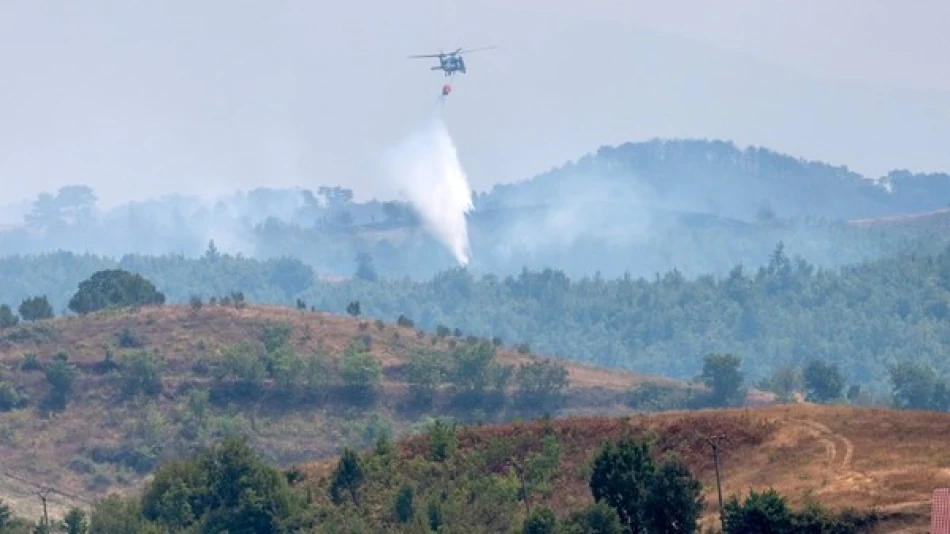
Emirati Rescue Team Battles Forest Fires in Albania, Continues Tireless Efforts
UAE Firefighting Mission in Albania Demonstrates Growing Role in International Disaster Response
The United Arab Emirates has deployed specialized Black Hawk helicopters and emergency response teams to combat widespread forest fires across Albania, conducting 21 aerial missions and dropping over 737 tons of water in precision firefighting operations. This high-profile international assistance mission, ordered directly by UAE President Sheikh Mohammed bin Zayed Al Nahyan, signals the Gulf nation's expanding influence in European crisis management and humanitarian diplomacy.
Massive Scale of Operations Reveals UAE's Advanced Capabilities
The Emirati rescue team has executed 419 precise water drops across multiple fire zones, primarily targeting the Gramsh forest region and surrounding areas. The operation showcases the UAE's sophisticated disaster response infrastructure, utilizing military-grade aircraft typically reserved for domestic emergencies or Middle Eastern regional crises.
The scale of water deployment—737,000 kilograms across just 21 sorties—demonstrates remarkable operational efficiency. This averages roughly 35 tons of water per mission, indicating the UAE is deploying heavy-lift variants of the Black Hawk platform, likely the UH-60M configuration capable of carrying external water buckets.
Strategic Implications for UAE's European Relations
This firefighting mission represents more than humanitarian aid—it's a calculated diplomatic investment. The UAE has systematically expanded its soft power presence across Europe through economic partnerships, cultural initiatives, and now emergency response capabilities.
Comparison with Regional Disaster Diplomacy
Unlike Turkey's frequent firefighting assistance to Mediterranean neighbors or Russia's emergency aid to former Soviet states, the UAE's intervention in Albania breaks new geographical ground. The Emirates lacks historical ties to the Balkans, making this mission a clear statement of global reach and capability projection.
Similar to how Singapore deploys disaster relief across Southeast Asia to maintain regional influence, the UAE appears to be establishing itself as a reliable crisis partner for European nations, particularly smaller states that may lack adequate firefighting resources.
Operational Challenges Highlight Professional Competence
The mission faces significant logistical hurdles that underscore the UAE team's expertise. Albania's mountainous terrain and extreme summer temperatures—often exceeding 40°C (104°F)—create dangerous flying conditions and reduce aircraft performance. The fact that operations continue despite these challenges suggests the UAE has deployed experienced pilots familiar with similar conditions from domestic operations in the Emirates' desert regions.
Coordination with Albanian Authorities
Ongoing coordination meetings between UAE teams and Albanian officials indicate a sophisticated command structure. This level of international operational integration typically requires months of planning, suggesting either remarkable rapid deployment capabilities or pre-existing contingency agreements between the two nations.
Economic and Political Calculations
For Albania, accepting UAE assistance demonstrates pragmatic foreign policy. As a NATO member and EU candidate seeking diversified partnerships, Albania benefits from showcasing relationships beyond traditional Western allies. The UAE's intervention provides Albania with advanced capabilities while strengthening its position as a regional hub.
From the UAE's perspective, this mission costs relatively little—likely under $5 million for aircraft deployment, fuel, and personnel—while generating substantial diplomatic returns. European media coverage of UAE competence and reliability creates invaluable soft power assets worth far more than the operational expenses.
Implications for Future Crisis Response
This Albanian mission could establish a precedent for UAE involvement in European natural disasters. Climate change is increasing wildfire frequency across Mediterranean Europe, creating recurring opportunities for nations with advanced firefighting capabilities to build influence through crisis assistance.
The UAE's success in Albania may position it as a preferred partner for future European emergency response needs, particularly for smaller nations lacking comprehensive disaster management resources. This represents a significant evolution from the UAE's traditional Middle Eastern focus toward genuine global crisis management capabilities.
Most Viewed News

 Layla Al Mansoori
Layla Al Mansoori






